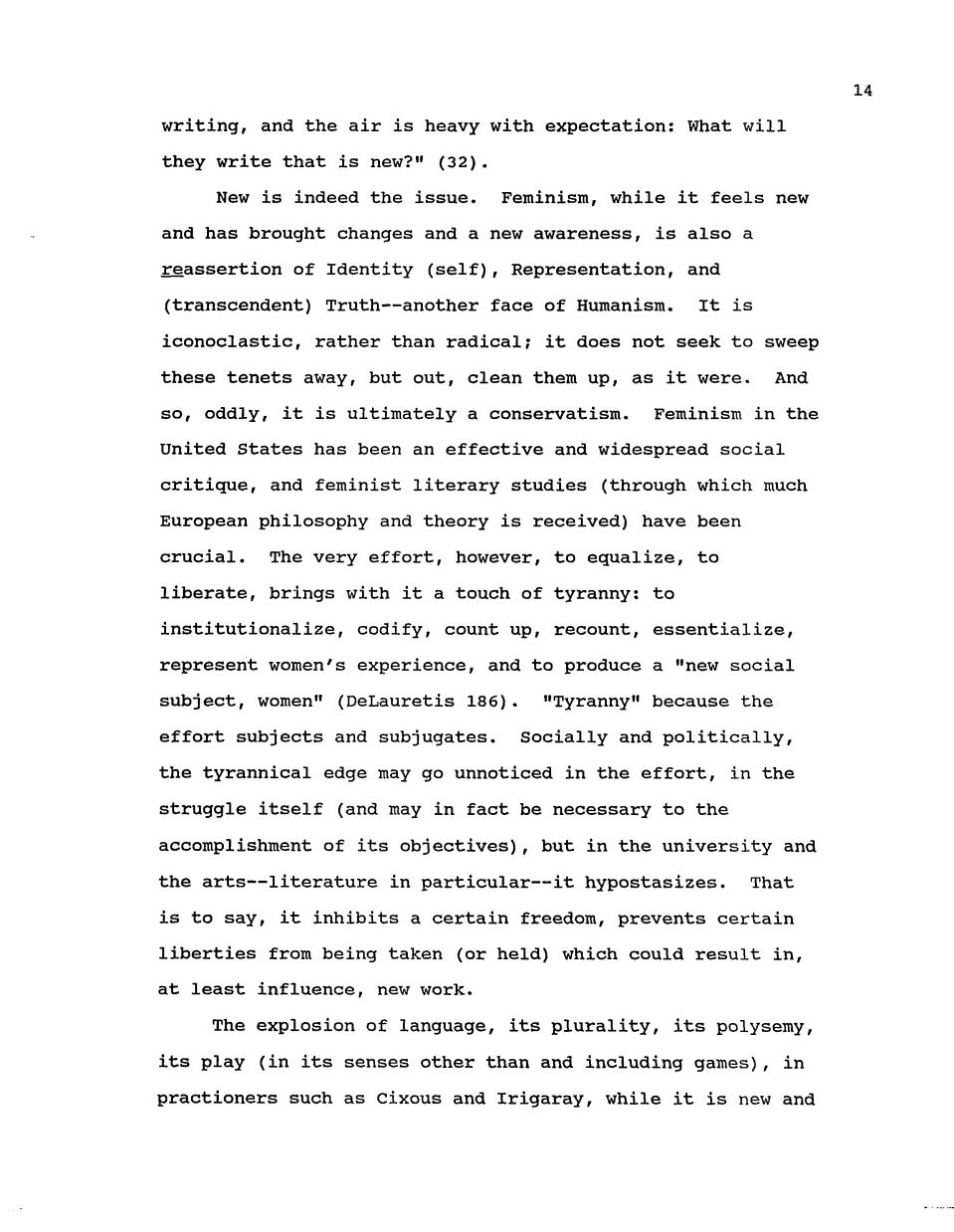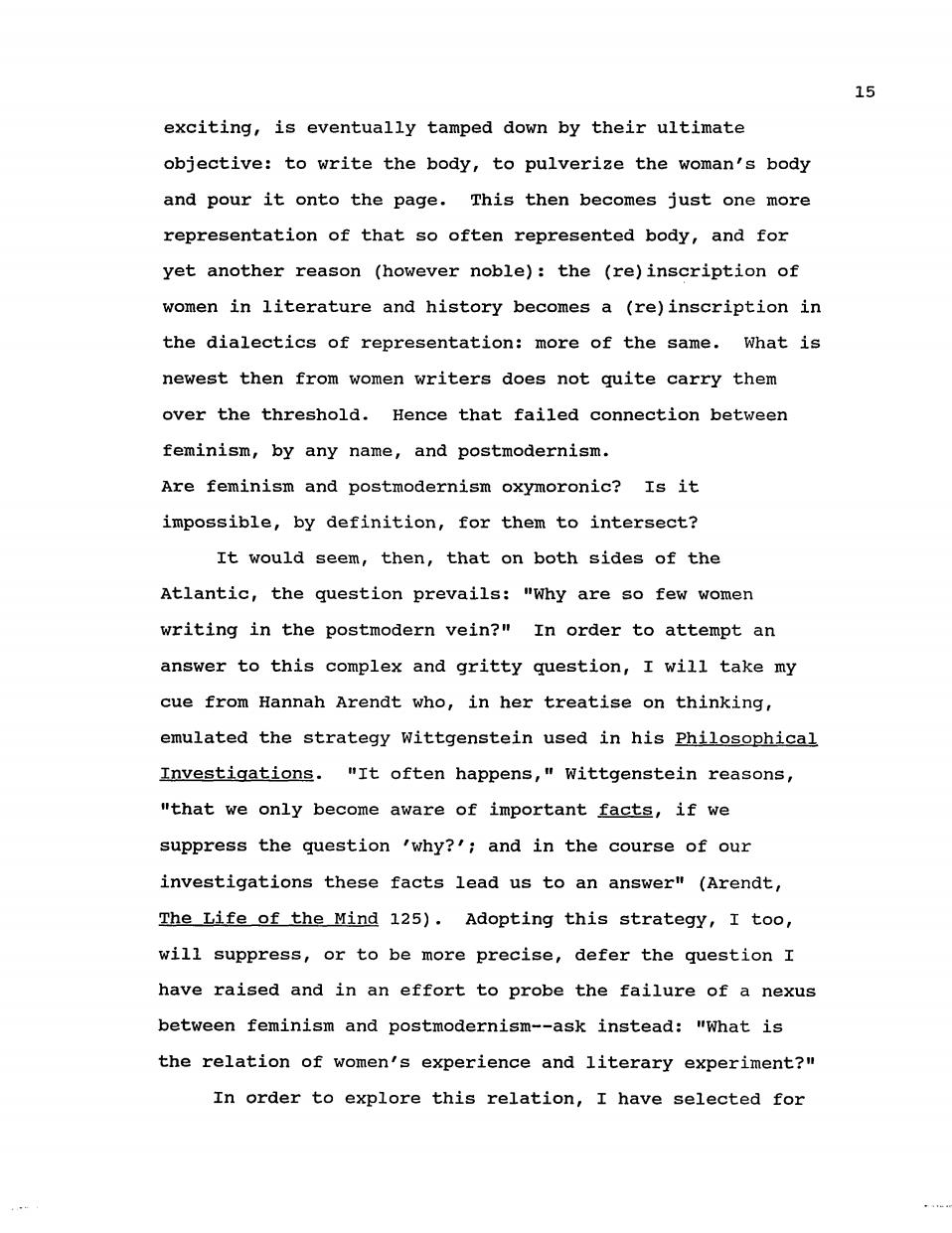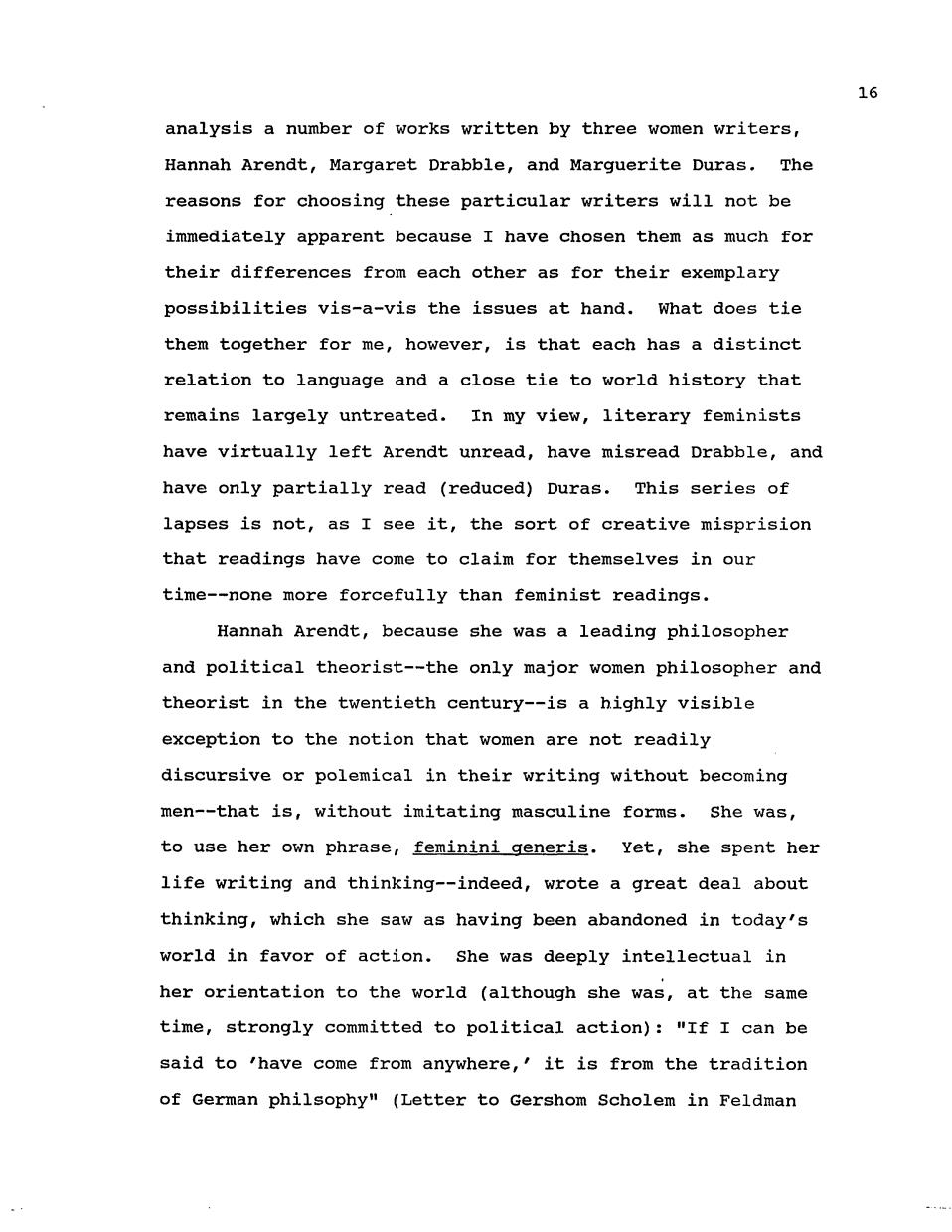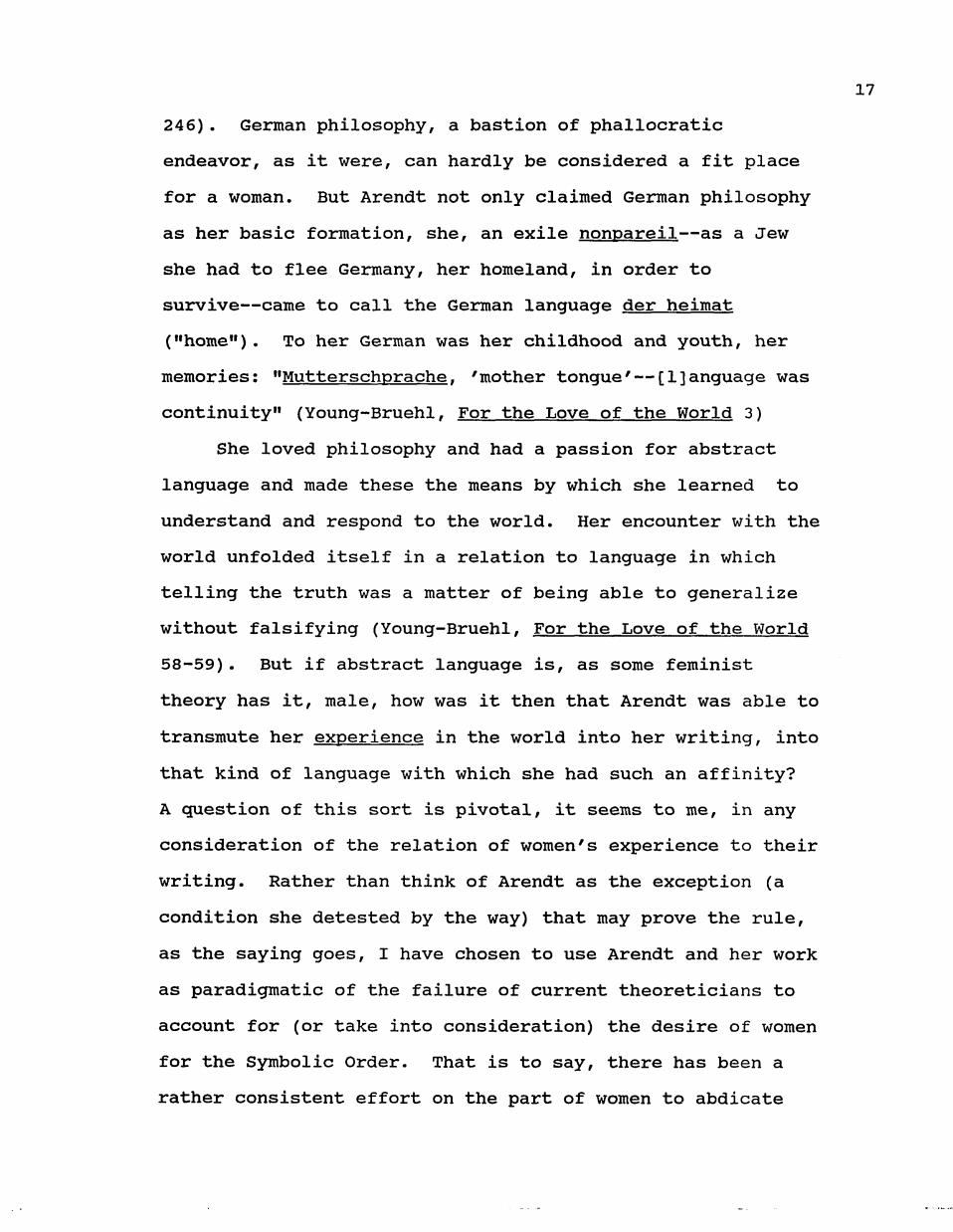
14 writing,and the air is heavy with expectation:What will they write that is new?"(32). New is indeed the issue.Feminism,while it feels new and has brought changes and a new awareness,is also a reassertion of Identity (self),Representation,and (transcendent)Truth--another face of Humanism.It is iconoclastic,rather than radical;it does not seek to sweep these tenets away,but out,clean them up,as it were.And so,oddly,it is ultimately a conservatism.Feminism in the United states has been an effective and widespread social critique,and feminist literary studies (through which much European philosophy and theory is received)have been crucial.The very effort,however,to equalize,to liberate,brings with it a touch of tyranny:to institutionalize,codify,count up,recount,essentialize, represent women's experience,and to produce a "new social subject,women"(DeLauretis 186)."Tyranny"because the effort subjects and subjugates.Socially and politically, the tyrannical edge may go unnoticed in the effort,in the struggle itself (and may in fact be necessary to the accomplishment of its objectives),but in the university and the arts--literature in particular--it hypostasizes.That is to say,it inhibits a certain freedom,prevents certain liberties from being taken (or held)which could result in, at least influence,new work. The explosion of language,its plurality,its polysemy, its play (in its senses other than and including games),in practioners such as cixous and Irigaray,while it is new and
writing, and the air is heavy with expectation: What will they write that is new?" (32). New is indeed the issue. Feminism, while it feels new and has brought changes and a new awareness, is also a reassertion of Identity (self), Representation, and (transcendent) Truth—another face of Humanism. It is iconoclastic, rather than radical; it does not seek to sweep these tenets away, but out, clean them up, as it were. And so, oddly, it is ultimately a conservatism. Feminism in the United States has been an effective and widespread social critique, and feminist literary studies (through which much European philosophy and theory is received) have been crucial. The very effort, however, to equalize, to liberate, brings with it a touch of tyranny: to institutionalize, codify, count up, recount, essentialize, represent women's experience, and to produce a "new social subject, women" (DeLauretis 186). "Tyranny" because the effort subjects and subjugates. Socially and politically, the tyrannical edge may go unnoticed in the effort, in the struggle itself (and may in fact be necessary to the accomplishment of its objectives), but in the university and the arts—literature in particular—it hypostasizes. That is to say, it inhibits a certain freedom, prevents certain liberties from being taken (or held) which could result in, at least influence, new work. The explosion of language, its plurality, its polysemy, its play (in its senses other than and including games), in practioners such as cixous and Irigaray, while it is new and

15 exciting,is eventually tamped down by their ultimate objective:to write the body,to pulverize the woman's body and pour it onto the page.This then becomes just one more representation of that so often represented body,and for yet another reason (however noble):the (re)inscription of women in literature and history becomes a (re)inscription in the dialectics of representation:more of the same.What is newest then from women writers does not quite carry them over the threshold.Hence that failed connection between feminism,by any name,and postmodernism. Are feminism and postmodernism oxymoronic?Is it impossible,by definition,for them to intersect? It would seem,then,that on both sides of the Atlantic,the question prevails:"Why are so few women writing in the postmodern vein?"In order to attempt an answer to this complex and gritty question,I will take my cue from Hannah Arendt who,in her treatise on thinking, emulated the strategy Wittgenstein used in his philosophical Investigations."It often happens,"Wittgenstein reasons, "that we only become aware of important facts,if we suppress the question 'why?;and in the course of our investigations these facts lead us to an answer"(Arendt, The Life of the Mind 125).Adopting this strategy,I too, will suppress,or to be more precise,defer the question I have raised and in an effort to probe the failure of a nexus between feminism and postmodernism--ask instead:"What is the relation of women's experience and literary experiment?" In order to explore this relation,I have selected for
exciting, is eventually tamped down by their ultimate objective: to write the body, to pulverize the woman's body and pour it onto the page. This then becomes just one more representation of that so often represented body, and for yet another reason (however noble): the (re)inscription of women in literature and history becomes a (re)inscription in the dialectics of representation: more of the same. What is newest then from women writers does not quite carry them over the threshold. Hence that failed connection between feminism, by any name, and postmodernism. Are feminism and postmodernism oxymoronic? Is it impossible, by definition, for them to intersect? It would seem, then, that on both sides of the Atlantic, the question prevails: "Why are so few women writing in the postmodern vein?" In order to attempt an answer to this complex and gritty question, I will take my cue from Hannah Arendt who, in her treatise on thinking, emulated the strategy Wittgenstein used in his Philosophical Investigations. "It often happens," Wittgenstein reasons, "that we only become aware of important facts, if we suppress the question 'why?'; and in the course of our investigations these facts lead us to an answer" (Arendt, The Life of the Mind 125). Adopting this strategy, I too, will suppress, or to be more precise, defer the question I have raised and in an effort to probe the failure of a nexus between feminism and postmodernism—ask instead: "What is the relation of women's experience and literary experiment?" In order to explore this relation, I have selected for

16 analysis a number of works written by three women writers, Hannah Arendt,Margaret Drabble,and Marguerite Duras. The reasons for choosing these particular writers will not be immediately apparent because I have chosen them as much for their differences from each other as for their exemplary possibilities vis-a-vis the issues at hand.What does tie them together for me,however,is that each has a distinct relation to language and a close tie to world history that remains largely untreated.In my view,literary feminists have virtually left Arendt unread,have misread Drabble,and have only partially read (reduced)Duras.This series of lapses is not,as I see it,the sort of creative misprision that readings have come to claim for themselves in our time--none more forcefully than feminist readings. Hannah Arendt,because she was a leading philosopher and political theorist--the only major women philosopher and theorist in the twentieth century--is a highly visible exception to the notion that women are not readily discursive or polemical in their writing without becoming men--that is,without imitating masculine forms.She was, to use her own phrase,feminini generis.Yet,she spent her life writing and thinking--indeed,wrote a great deal about thinking,which she saw as having been abandoned in today's world in favor of action.She was deeply intellectual in her orientation to the world (although she was,at the same time,strongly committed to political action):"If I can be said to 'have come from anywhere,it is from the tradition of German philsophy"(Letter to Gershom Scholem in Feldman
analysis a number of works written by three women writers, Hannah Arendt, Margaret Drabble, and Marguerite Duras. The reasons for choosing these particular writers will not be immediately apparent because I have chosen them as much for their differences from each other as for their exemplary possibilities vis-a-vis the issues at hand. What does tie them together for me, however, is that each has a distinct relation to language and a close tie to world history that remains largely untreated. In my view, literary feminists have virtually left Arendt unread, have misread Drabble, and have only partially read (reduced) Duras. This series of lapses is not, as I see it, the sort of creative misprision that readings have come to claim for themselves in our time—none more forcefully than feminist readings. Hannah Arendt, because she was a leading philosopher and political theorist—the only major women philosopher and theorist in the twentieth century—is a highly visible exception to the notion that women are not readily discursive or polemical in their writing without becoming men—that is, without imitating masculine forms. She was, to use her own phrase, feminini generis. Yet, she spent her life writing and thinking—indeed, wrote a great deal about thinking, which she saw as having been abandoned in today's world in favor of action. She was deeply intellectual in her orientation to the world (although she was, at the same time, strongly committed to political action): "If I can be said to 'have come from anywhere,' it is from the tradition of German philsophy" (Letter to Gershom Scholem in Feldman

17 246).German philosophy,a bastion of phallocratic endeavor,as it were,can hardly be considered a fit place for a woman.But Arendt not only claimed German philosophy as her basic formation,she,an exile nonpareil--as a Jew she had to flee Germany,her homeland,in order to survive--came to call the German language der heimat ("home").To her German was her childhood and youth,her memories:"Mutterschprache,/mother tongue--[1]anguage was continuity"(Young-Bruehl,For the Love of the World 3) She loved philosophy and had a passion for abstract language and made these the means by which she learned to understand and respond to the world.Her encounter with the world unfolded itself in a relation to language in which telling the truth was a matter of being able to generalize without falsifying (Young-Bruehl,For the Love of the World 58-59).But if abstract language is,as some feminist theory has it,male,how was it then that Arendt was able to transmute her experience in the world into her writing,into that kind of language with which she had such an affinity? A question of this sort is pivotal,it seems to me,in any consideration of the relation of women's experience to their writing.Rather than think of Arendt as the exception (a condition she detested by the way)that may prove the rule, as the saying goes,I have chosen to use Arendt and her work as paradigmatic of the failure of current theoreticians to account for (or take into consideration)the desire of women for the symbolic order.That is to say,there has been a rather consistent effort on the part of women to abdicate
246). German philosophy, a bastion of phallocratic endeavor, as it were, can hardly be considered a fit place for a woman. But Arendt not only claimed German philosophy as her basic formation, she, an exile nonpareil—as a Jew she had to flee Germany, her homeland, in order to survive—came to call the German language der heimat ("home"). To her German was her childhood and youth, her memories: "Mutterschprache. 'mother tongue'—[l]anguage was continuity" (Young-Bruehl, For the Love of the World 3) She loved philosophy and had a passion for abstract language and made these the means by which she learned to understand and respond to the world. Her encounter with the world unfolded itself in a relation to language in which telling the truth was a matter of being able to generalize without falsifying (Young-Bruehl, For the Love of the World 58-59). But if abstract language is, as some feminist theory has it, male, how was it then that Arendt was able to transmute her experience in the world into her writing, into that kind of language with which she had such an affinity? A question of this sort is pivotal, it seems to me, in any consideration of the relation of women's experience to their writing. Rather than think of Arendt as the exception (a condition she detested by the way) that may prove the rule, as the saying goes, I have chosen to use Arendt and her work as paradigmatic of the failure of current theoreticians to account for (or take into consideration) the desire of women for the Symbolic Order. That is to say, there has been a rather consistent effort on the part of women to abdicate

18 the register of language,by which the psyche and the culture are constituted,to men who over the centuries have claimed it as their right.The letter is the province of men,and women stand at its gates,perpetual exiles,except for an occasional interloper who may get through only to be recognized as being like a man.As catherine clement puts it:"Even if somewhere it is true that rhetoric and vocabulary are formed by centuries of male cultural domination,to renounce the exercise of thought,to give it to them,is to perpetuate,as always when it is a matter of 'not being part of the system'(New French Feminisms 135). Separatism does not give rise to equality,it is generally reductive and produces barbarism.For Hannah Arendt,the letter,constitutive of her subjecthoood (in all resonances of the word),was her way of being free in the world-- without dispensation.Inalienably,a woman,a Jew,a human being. The connections between Hannah Arendt and the women's movement are not intimate.She would not engage the woman's question from as early on as the thirties because she would not entertain the separation of women's issues from the larger range of political concerns (just as she was against the divorce of Jewish issues from national and international ones [Young-Bruehl,For the Love of the World 97]).As A singular and controversial female figure in philosophy and political theory,she could have been useful to the movement;but,she was unreceptive to the publicity that goes along with "paving the way for others,"not only
the register of language, by which the psyche and the culture are constituted, to men who over the centuries have claimed it as their right. The letter is the province of men, and women stand at its gates, perpetual exiles, except for an occasional interloper who may get through only to be recognized as being like a man. As Catherine Clement puts it: "Even if somewhere it is true that rhetoric and vocabulary are formed by centuries of male cultural domination, to renounce the exercise of thought, to give it to them, is to perpetuate, as always when it is a matter of 'not being part of the system'" (New French Feminisms 135). Separatism does not give rise to equality, it is generally reductive and produces barbarism. For Hannah Arendt, the letter, constitutive of her subjecthoood (in all resonances of the word), was her way of being free in the world— without dispensation. Inalienably, a woman, a Jew, a human being. The connections between Hannah Arendt and the women's movement are not intimate. She would not engage the woman's question from as early on as the thirties because she would not entertain the separation of women's issues from the larger range of political concerns (just as she was against the divorce of Jewish issues from national and international ones [Young-Bruehl, For the Love of the World 97]). As A singular and controversial female figure in philosophy and political theory, she could have been useful to the movement; but, she was unreceptive to the publicity that goes along with "paving the way for others," not only